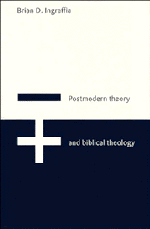Book contents
- Frontmatter
- Contents
- Acknowledgements
- List of abbreviations
- Note on translations of the Bible
- Introduction: postmodernism, ontotheology, and Christianity
- 1 NIETZSCHE'S MOCKERY: THE REJECTION OF TRANSCENDENCE
- II HEIDEGGER'S FORGETTING: THE SECULARIZATION OF BIBLICAL ANTHROPOLOGY
- 6 From the death of God to the forgetting of Being
- 7 Heidegger's theological origins: from biblical theology no to fundamental ontology
- 8 The redemptive–eschatological separation of flesh and Spirit in the epistles of the Apostle Paul
- 9 Inauthenticity and the flesh
- 10 The eigentlich Selbst or the pneumatikos anthropos
- III DERRIDA'S DENIALS: THE DECONSTRUCTION OF ONTOTHEOLOGY
- Conclusion: ontotheology, negative theology, and the theology of the cross
- Notes
- Bibliography
- Index
6 - From the death of God to the forgetting of Being
Published online by Cambridge University Press: 01 June 2011
- Frontmatter
- Contents
- Acknowledgements
- List of abbreviations
- Note on translations of the Bible
- Introduction: postmodernism, ontotheology, and Christianity
- 1 NIETZSCHE'S MOCKERY: THE REJECTION OF TRANSCENDENCE
- II HEIDEGGER'S FORGETTING: THE SECULARIZATION OF BIBLICAL ANTHROPOLOGY
- 6 From the death of God to the forgetting of Being
- 7 Heidegger's theological origins: from biblical theology no to fundamental ontology
- 8 The redemptive–eschatological separation of flesh and Spirit in the epistles of the Apostle Paul
- 9 Inauthenticity and the flesh
- 10 The eigentlich Selbst or the pneumatikos anthropos
- III DERRIDA'S DENIALS: THE DECONSTRUCTION OF ONTOTHEOLOGY
- Conclusion: ontotheology, negative theology, and the theology of the cross
- Notes
- Bibliography
- Index
Summary
Being able to estimate, to esteem, that is, to act in accordance with the standard of Being, is itself creation of the highest order. For it is preparation of readiness for the gods; it is the Yes to Being. “Overman” is the man who grounds Being anew.
Heidegger, Nietzsche, volume 1Nietzsche, the thinker of the thought of will to power, is the last metaphysician of the West. The age whose consummation unfolds in his thought, the modern age, is a final age. This means an age in which at some point and in some way the historical decision arises as to whether this final age is the conclusion of Western history or the counterpart to another beginning.
Heidegger, Nietzsche, volume IIIHeidegger follows Nietzsche in attempting to uncover the essence of metaphysics, to encapsulate the history of Western philosophy from Plato to the present within this essence, and to inaugurate a new way of thinking. “Heidegger agrees with Nietzsche on the basic matter: all previous philosophy is governed by Platonism and what is needed is the overcoming of Platonism.” But Heidegger places Nietzsche within, even though at the end of, the metaphysics Nietzsche claimed to have overcome. Whereas Nietzsche wants to deconstruct the metaphysical distinction between two worlds, between the true world of being and the apparent world of becoming, Heidegger wants to reinstate a distinction, the difference between Being and beings, without falling back into a metaphysical distinction between a noumenal and physical world or a theological distinction between the earthly and the heavenly.
- Type
- Chapter
- Information
- Postmodern Theory and Biblical TheologyVanquishing God's Shadow, pp. 101 - 109Publisher: Cambridge University PressPrint publication year: 1995



